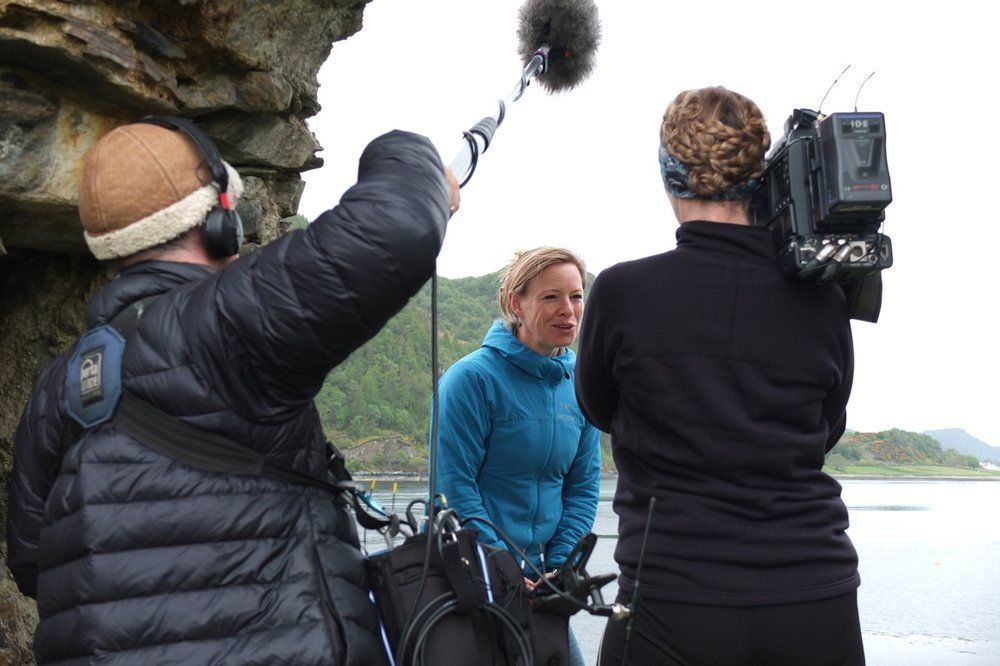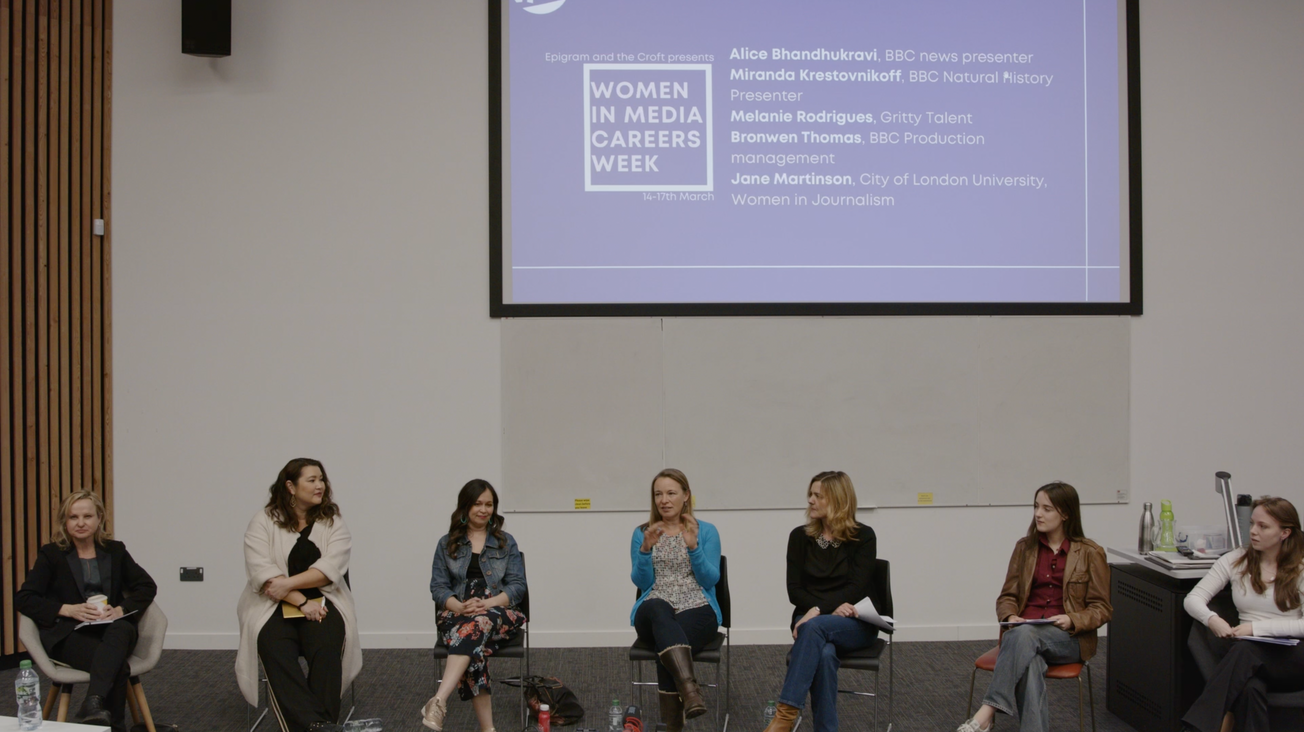By Lauren Sanderson, Features Editor
At the first event of Epigram and the Croft’s ‘Women in Media’ careers week, Deputy Editor Marine Saint and Creative Director Freya Shaw sat down with a diverse panel of inspiring women from the media sector. In what promised to be the first insightful discussion of many, a lecture theatre of aspiring media professionals gathered to watch the hour-long panel delve into their career experiences and advice on accessing the industry.
The panel brought with them a wealth of experience from all corners of the media industry. Professor Jane Martinson has held positions including New York Correspondent and US Business Editor, Head of News and Media, and later Women’s Editor at the Guardian. She is an Executive Committee member of Women in Journalism.
'I love stories. You get to ask anybody you like questions, which still, for me, makes me happy everyday.'
Delighted to speak to young women interested in journalism in Bristol today. Great job @MarineSaint02 @freyashaww1 and @EpigramPaper . Names to watch https://t.co/jcDvZ4EEKK
— jane martinson (@janemartinson) March 14, 2023
Bristol alumni Alice Bhandhukravi has been a presenter and reporter for BBC London News since 2006, including the Six and Ten o’clock news. She has reported as BBC London anchor on momentous historical events including the Grenfell Tower fire and the death of Queen Elizabeth II.
'When you're a journalist at the BBC and you're a presenter or you're a reporter, you write your own scripts. You've already been there for eight or ten hours, writing the stories yourself.
'You get a story in the morning, and at six o'clock in the evening, no matter what you're doing or how that story is going, you will be on television, on BBC One, telling that story.'
Despite having already qualified as a journalist by the time she secured her first job at the BBC, aged 3o, she started out 'at the very bottom of the foodchain in a newsroom,' as an assistant.
Alice laughed, 'I was really bad at that job. They thought they couldn't have me doing that, because I was a liability.'
When she later grasped the opportunity to present a live bulletin, 'they put me on air with no training whatsoever. It was sink or swim. If you could manage to be on BBC One live, then they'd consider training you after that.'
Another Bristol alumni and expert in creative diversity, Melanie Rodrigues is the founder of Gritty Talent, a trailblazing company that connects people from underrepresented groups to the media industry.
With no family ties to the industry, it was while attending Bristol that she discovered a love for student media. 'I realised that rather than being a lawyer, I could still do the social activism that I was interested in, but do it via journalism.' Melanie went on to work in factual production, contributing to major national shows like Watchdog, the One Show, Crimewatch and Horizon.
Biologist, author, presenter, and Bristol alumni Miranda Krestovnikoff specialises in natural history and archaeological programmes, and was listed as one of the top 100 most influential women in the west in 2018.
Production manager Bronwen Thomas has 26 years of experience at the BBC, and has worked on productions including Planet Earth 3, Sport Relief and Comic Relief. She decided to pursue a career in television after attending a careers talk in her third-year of university.
Despite their overwhelming, even intimidating, list of accolades, the panellists' pathways into the media industry were far from straightforward. 'I applied for about 50 jobs, and got about 50 rejections,' said Bronwen. Recalling their early career steps, a common theme emerged of hard work and minimal pay.
Jane—now the Marjorie Deane Professor of Financial Journalism at City University—was a first generation student: 'I was the first in my family to go to university, I went to a comprehensive school, I didn't know anyone who was a journalist. I really wanted to be a journalist but I didn't have the network or the contacts.'
'You don't have to already have the contacts, you can make them.'
Melanie attributes her advocacy for diversity in the media industry to her early experience as the only mixed-race student at her school. She was hardwired to be a campaigner, she tells the audience.
After nearly two decades working in production, Melanie was diagnosed with a long-term health condition. She began to notice that the teams she was working with did not represent the diversity she saw in her audiences, and 'walked out of a secure, well-paid job at the BBC, to start my own company.'
She informed the audience that most TV production companies in the UK supply the international market. 'If you're making programmes for the globe, you need your production team to reflect your global audience.'
'Having worked in the sector, my mission now is trying to help people from all backgrounds, who have the skill and the ambition, to survive in an industry which hasn't been as inclusive as I think it needs to be.' All of the senior team at Gritty Talent are women, two of whom have disabilities, and two of whom have young children.
You might expect the pinacle of Miranda's career to be her work presenting the BAFTA award-winning series Coast. But her proudest career achievement, she told the audience, has been holding down a full-time job as a freelance presenter whilst navigating motherhood.
She addressed one of the all too common barriers facing women in the industry, who return from maternity leave to find their positions occupied. 'If I had taken time off with my children, there would have been no job to come back to. And that was a very real threat.' Miranda worked throughout her pregnancy, and later fed and changed her children's nappies on set.

The unfortunate reality of the media industry: 'If you are a woman in TV and you're under 40, you're still massively underrepresented in most decision-making roles, particularly editorial. TV is still predominantly made by people from quite affluent backgrounds.'
So, what does it take to succeed as a woman in media? As Bronwen said, 'It's not all about what you've got on a sheet of paper.'
What you need to be a journalist, the panel advised, is tenacity. 'That's the job. It doesn't matter what kind of journalism, that is the nature of the beast,' Jane told the audience. Jane tells her journalism students to pick up the phone—when you talk to people, you get better stories.
Miranda recalled her early career search: 'I remember going to a job interview, and someone saying to me "I have a thousand applicants for this job, you're only going to get the job if you are top of my pile. What are you going to go and do to make yourself top of that pile? Come back to me and I will give you a job when you are worthy of people top of that pile."'
'There are jobs out there. If you are determined enough and singleminded enough to get them, you can get them.' Bronwen echoed this sentiment, 'Especially as women, we can struggle with imposter syndrome and hold ourselves back a bit.'
'But someone has to get those jobs, who says it isn't going to be you?'
Alice's pathway into the BBC wasn't smooth-sailing. She applied to work at the BBC and was rejected several times. She returned to university to pursue a postgraduate qualification in Broadcast Journalism, which she described as her 'passport into news.' For those facing financial barriers to further qualifications, Melanie recommends ScreenSkills, the industry training body, where you can access free, online courses. GrittyTalent also list free training providers on their site.
Alice was an interviewer on last year's recruitment panel for the highly prestigious and competitive BBC Apprenticeship Scheme. She advised that making yourself memorable, even on paper, can help you stand out amongst a crowded cohort of applicants. For those recent grads lacking work experience, this could be as simple as the ability to 'tell the story' of your passion for a memorable subject area.
Alice highlighted the ease with which aspiring media professionals can utilise digital content creation—from blogs and published articles to TikToks and YouTube videos—to boost their portfolios and evidence their commitment to future employers.
In addition to the panel's hard-hitting career advice, Melanie reminded the group that no job is worth compromising your mental or physical health: 'I think it's worth saying, as most of us are women in this room, that we already understand our bodies better because most of us have had a menstrual cycle. If you're in tune with your body, I think that you can make really good decisions about how you work.'
One of the biggest takeaways from the discussion was the need for ongoing work towards diversity and inclusion. Melanie considered the very real barrier presented by the freelance, short-term nature of contracts in the industry. For graduates without UK home student status seeking entry-level work, this can make securing their first job especially difficult.
Alumni Series: Interview with wildlife and TV presenter Miranda Krestovnikoff
Alumni Series: Investigative journalist Alexander MacKay on documenting poverty in Afghanistan and Pakistan
'There is a real danger that people feel they can only apply for more menial, low-paid jobs. But actually, if you're a graduate with significant skill, this country still be embracing that amazing skill. This isn't really happening the way it should.'
She advised that roles that support production in production companies, like finance and administration, tend to offer longer term employment contracts that could provide later opportunities for career development within the company.
'Go for it, because we need people like you to run TV.'
Featured Image: Epigram
Find out about future ‘Women in Media’ career events and access resource packs and CV helpers here.








